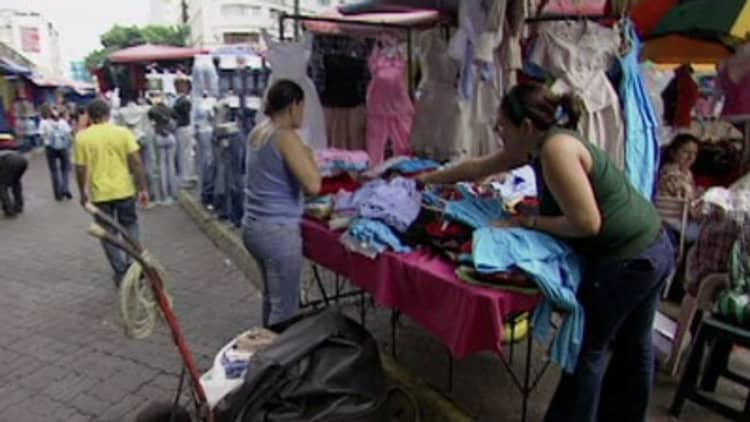
Rampant inflation is nothing new to the Venezuelan economy, but in a sign of how severe the situation has grown for some people there, food prices spiked by 22.2 percent in August from the previous month, according to new research.
This inflation figure represents the highest August rate in 20 years, according to data from the Caracas-based workers' advocacy group Cenda. The group said on Friday that even though prices climbed at a slower pace than the 32.6 percent inflation rate recorded in July, economists worry that Venezuela may be on the brink of greater unrest.
Paula Diosquez-Rice, principal economist at IHS Global Insight, a global financial risk analysis company, said the figures provide further evidence that Venezuela's economic conditions are increasingly unsustainable.
"This situation has been escalating," said Diosquez-Rice. "The people of Venezuela have had a scarcity of items for a while now."
More and more, Venezuelans are turning to the black market to get their hands on critical goods, Diosquez-Rice added, as the price of food in supermarkets is controlled by the government. "A worker on minimum wage can only afford to do grocery shopping for one week [of each month]," said Cenda in a translation of its report.
With little on the shelves, people are desperate, driving up prices of the goods they can find. Shortages will only get worse, as oil prices are likely to remain low and the country's debt grows.Shannon O'Neilsenior fellow, Council on Foreign Relations
Venezuelan President Nicolás Maduro's government also controls the types of economic data that are published. The country has not reported monthly inflation data since December of last year, when the annual rate climbed to a staggering 68 percent. Estimates of monthly inflation are recorded only by private organizations such as Cenda that conduct their own surveys.
In its most recent World Economic Outlook, released last week, the IMF projected that Venezuela will experience a deep recession in 2015 and 2016. Gross domestic product is forecast to contract about 10 percent in 2015, and inflation is seen hitting 159 percent for the same period. It's unlikely that the central bank will report those economic indicators until after the congressional elections scheduled for Dec. 6, according to Diosquez-Rice.
A number of emerging nations have been hit hard by a slump in commodity prices that began last year. But Venezuela, a major oil producer, has been hit especially hard because its domestic economy and government budget are both highly dependent on oil revenue.

"During the oil price boom, the Venezuelan government intervened throughout the economy, undermining many sectors, including agriculture. Domestic food production plummeted, requiring the country to import most of its food," said Shannon O'Neil, senior fellow for Latin America Studies at the Council on Foreign Relations. "Now, with oil prices down, the government is running out of dollars, forcing it to severely limit imports, including food and other basic necessities."
The Venezuelan bolivar has also plunged against a stronger U.S. dollar. Maduro's government has printed more bolivars in an effort to pay off its budget deficit.
"With little on the shelves, people are desperate, driving up prices of the goods they can find," said O'Neil. "Shortages will only get worse, as oil prices are likely to remain low and the country's debt grows."
— CNBC's Silvana Ordonez contributed to this report.

